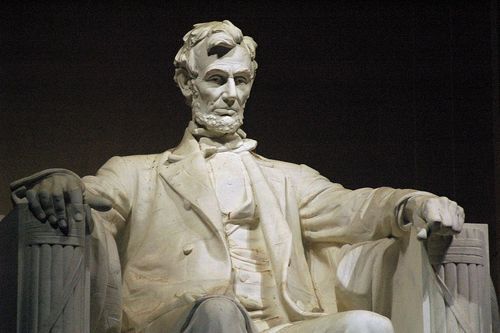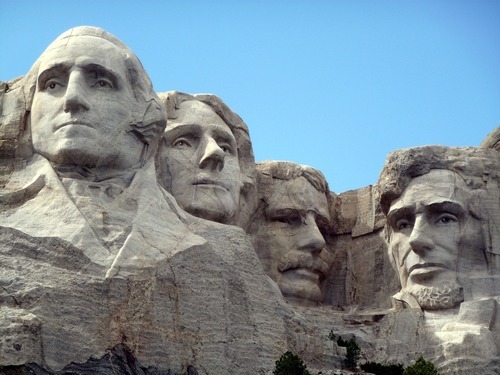Leadership Qualities from an “Underdog”
Growing up in New York City one of the yearly school outings was a trip to Washington D.C. One of our significant points of interests was the Lincoln Memorial. As you walk in, lying between the north and south chambers is the central hall containing an enormous white marble statue of Abraham Lincoln. According to the visitor’s pamphlets, we are told that it took four years to complete this 19 foot tall, 19 foot wide and 175 tons statue.

When I moved to Oregon my family and I stopped at Keystone, South Dakota to visit Mount Rushmore National Memorial. And there, too, was an enormous sculpture, a 60 foot sculpture of the head of Abraham Lincoln, along with the heads of four other United States Presidents (George Washington, Thomas Jefferson, and Theodore Roosevelt).

If you had never heard of Abraham Lincoln, (obviously you are not from this planet!) one would wonder what is it about this man that has compelled artists to carve these enormous sculptures of him.
In reading Team of Rivals it is evident that Abraham Lincoln was more than the 16th President of the United States of America. He was more than the man who signed the Emancipation Proclamation. Lincoln was a leader who embodied the attributes of great leadership. However, learning about Lincoln’s humble beginnings one would not be led to believe this about him. Growing up in a poor family, his lack of education, his encounter with multiple deaths and suffering in his family did not deter him from becoming a great leader.
Lincoln was considered to be the underdog in the 1860 presidential election. “There was little to lead one to suppose that Abraham Lincoln…who scarcely had a national reputation, nothing to equal any of his other three rivals, who had served only a single term in Congress, twice lost bids for the Senate, and had no administrative experience, would become the greatest historical figure of the nineteenth century.”[1]
So, what leadership qualities can we learn from this “underdog?” Lincoln demonstrated courage, strength and humility in selecting his Cabinet. He incorporated some of his major political rivals to be part of his cabinet. When asked why he had chosen a cabinet of comprised of enemies and opponents Lincoln responded, “We needed the strongest men of the party in the Cabinet. We needed to hold our own people together. I had looked the party over and concluded that these were the very strongest men. Then I had no right to deprive the country of their services.”[2] It takes courage and humility to be willing to build a team that has big egos and very different views than your own. Sometimes it is easier to build a team with people who may not disagree with you. However, as a leader one must determine what is good for the whole and not just about “you.” Having the courage to build a team with different views enables a leader to sharpen their listening skills. It enables you to listen to competing ideas and to process what you have heard. A good leader needs to be able to invite dialogue and allow others to express their ideas and opinions without fear of retaliation. Lincoln may have selected strong men, but it was he who emerged as the strongest leader. [3]
Learning is another leadership quality we can learn from Lincoln. For Lincoln, books became his academy, his college.[4] He read whatever he could find. Goodwin writes, that everyone Lincoln went, he carried a book with him.[5] (too bad Kindle wasn’t invented!) Lincoln had little to no formal education yet he was passionate about reading and learning. What Lincoln lacked in preparation and guidance, he made up for with his daunting concentration, phenomenal memory, acute reasoning faculties, and interpretive penetration.[6] This passion for learning is what made him a great leader.
Perhaps a leadership quality that many of us may lack is humor. Lincoln had a good sense of humor. He recognized that humor was part of his temperament and so he used it well in his leadership. We need to learn how to use humor to teach simple, yet profound lessons. Humor can deflate without destroying; it can instruct while it entertains; it saves us from our pretensions; and it provides an outlet for feeling that expressed another way would be corrosive.”[7]
Another leadership quality of this “underdog” was empathy. Lincoln possessed extraordinary empathy. He had the ability to put himself in the place of another, to experience what they were feeling, to understand their motives and desires.[8] His crowning gift of political diagnosis was due to his sympathy, which gave him the power to forecast with uncanny accuracy what his opponents were likely to do.[9]
The leadership qualities from this “underdog” inspire people to keep making sacrifices in spite of their hardships and suffering. This “underdog” gained the trust, loyalty and respect of the people.
Leave a Reply
You must be logged in to post a comment.